In the last months of last year—a year just barely passed; are we sure it’s 2023 now? Really?—I had, for various reasons, occasions to move a lot of my books around. I could get into the whys and the wherefores, the reasons and the inciting incidents, but the important thing is this: I highly recommend this process.
Put your hands on your books. All of them. Are you sure you know what’s in there?
The reason for moving all the fiction was simple: The bookshelves overflowed and needed to be expanded. I looked forward to this process for the weeks it took for more shelving to arrive. I would sit with my morning coffee and think, I get to rearrange you soon at the shelves.
With a little more room up top, I moved everything up, trying to leave just a little space at the end of each shelf for the books I knew would be added before too long (and a lot of room in the Ws, because Chuck Wendig’s big chonky Wayward is in my TBR pile). I dusted and tidied and only found one dead spider along with all the cat fur. Now, everything is lined up neatly; everything belongs where it is. And I want it all to be there. There wasn’t anything about which I thought, Well, this can go in the discard pile. It was a deeply satisfying feeling.
Pulling down and replacing every book on your main shelves can be a kind of ritual, a trip down memory lane that reminds you, in brief flashes and long reveries, how you got to where you are. It’s turning to the back of a book to find the name and semester of the class it was read for, scratched lightly in pencil in the back cover. It’s remembering which books were purchased in which cities; which were gifts; which you have duplicates of, in case a friend needs them. (If you don’t hoard duplicates of your favorites, this is another thing I recommend.)
Every time I’ve moved, I’ve gotten rid of books, for better or for worse. Rearranging is also seeing where the holes are, and considering whether they need filling. What do you miss? What library reads do you wish you had your own copies of? Which books were lent out, never to return? Should you replace them?
Take the books off the shelves. Dust them, thumb through them, find yourself surprised about what you do and don’t remember. Line them up however you like—by size, by color, by author, by vibes—and then, when everything you’ve read is sorted, tackle the real challenge.
The unread books.
When our holiday plans went awry, I did what any sensible book collector would do in my place: I spent Christmas Eve piling every single book from the unread books bookcase onto the dining room table, dusting them, considering them, and deciding their fates.
I look at these books all the time, but touching them, moving them around, deciding how to put them back (on which shelf? in which order?) is something entirely different. The unread books have been piling up for at least two decades—a sentence which is worrying yet inevitable when a person has been a reader since a very young age. Some of those aging books are still things I want to read. And some, inevitably, are not.
Taking all the books down was a chance to organize and cull, but primarily, it was an experience in simply remembering what was there, how it got there, and why. You can look at shelved books until the cows come home, but it’s not the same as actually taking them off the shelves. Any bookstore browser can tell you this: Looking is one thing, handling another. I could look at that shelf every day and still discover, in the reorganizing, that I’d forgotten something—a book tucked behind another, one in the back corner behind the cat tree, something with a small spine that just didn’t stand out.
I’d forgotten I had Ann Leckie’s The Raven Tower. I put all the Catherynne Valente books together and was alarmed at how behind I am (I’ve still read as many of her books as I own unread ones, but she has written a lot of books). I piled up the books about work and life and jobs and balance; I made another stack of sort-of fairytale/folklore-y novels. One stack is “books by people I at least sort of know and should definitely have read by now.” Another is nature-y books. There is a lot of -ish and -like and kinda in these stacks. They are themes, not categories.
Buy the Book
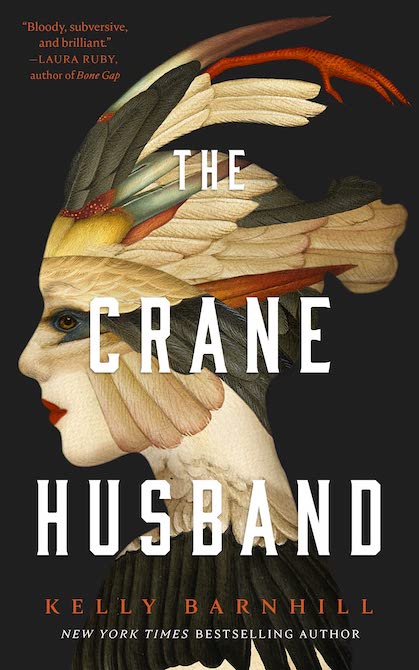

The Crane Husband
This is where I indulge my chaos. The unread books had been sorted into nonfiction and fiction, but that felt too rigid. The SFF piles needed shuffling, new books next to old, The World We Make waiting there for me right by Assassin’s Fate (I’m still not ready). All the shelving habits in which I do not indulge for the read books get indulged in the unreads: size, theme, mood, basically anything but color. (Nothing against color! I’m just never happy with it.)
I can’t tell you how many treasures I found, how many impulse purchases or neglected gifts or long-forgotten books seemed to take on new life as I stacked and sorted and restacked. My pile of Australian fiction that I meant to read when I got back from a friend’s wedding! All the Annie Dillard books I’ve been meaning to read! The Only Good Indians, still under consideration in the “Will it be too scary for me?” category!
Even if you don’t have twenty years’ worth of unread books, sorting through those you do have can be an effective way to remember why you picked them up in the first place. It might move new books to the top of the pile. It also might move some books out of the pile altogether.
Because that, of course, was part of the point. The books were double-stacked. It was too many. I had to let some go. And if you’re aghast at the idea of getting rid of books you haven’t read yet, I understand. They are all potentials, all things you might yet love. But books, like anything, have their time, and they have their time in your life. That essay collection that felt so vital in 2018 now feels like something from another era. Books bought on impulse in the 2000s are tweens and teens now, and some of them don’t resonate the way they once did. Some do! And some feel a little bit like unnecessary anchors, things weighing you down, distracting from what you really want to be reading.
It’s okay to not want to read something any more. (It might come back to you later anyway, if you really need it.) It’s okay to narrow down, to clear out, to freshen up—bookshelves as much as anything else. The things that are leaping out at me from the rearranged bookcase feel different—looser, brighter, lovelier. I want to read them all at once. First, I need to finish the book I bought for a book group three months ago. The one I had entirely forgotten until I found it wedged between hardcovers on the unread shelf.
Molly Templeton lives and writes in Oregon, and spends as much time as possible in the woods. Sometimes she talks about books on Twitter.










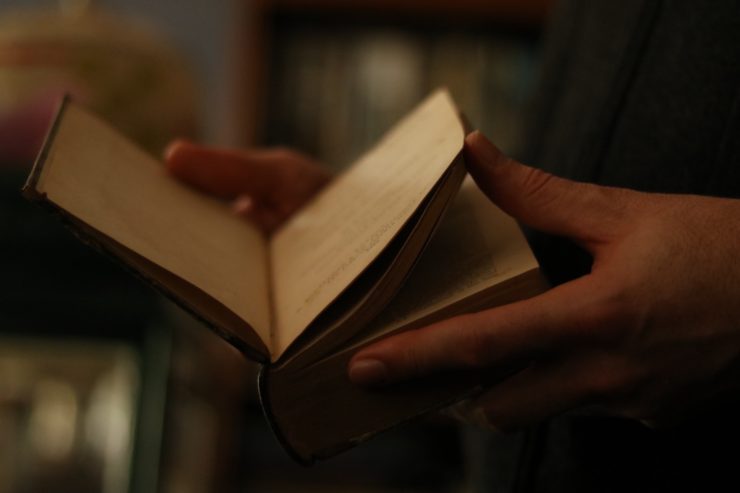
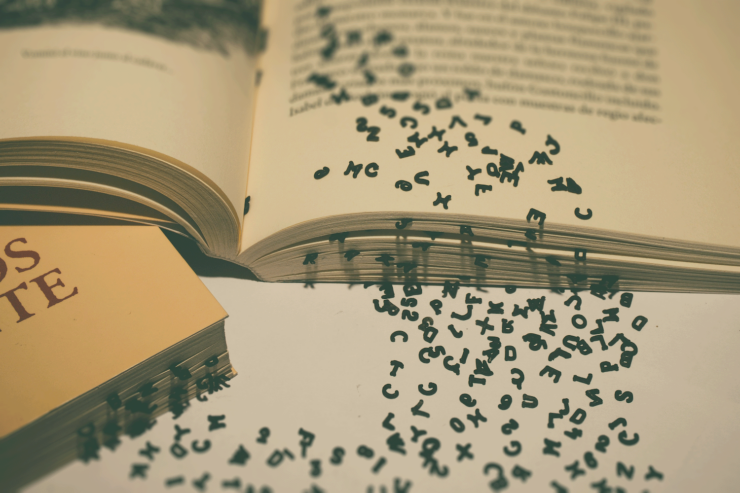
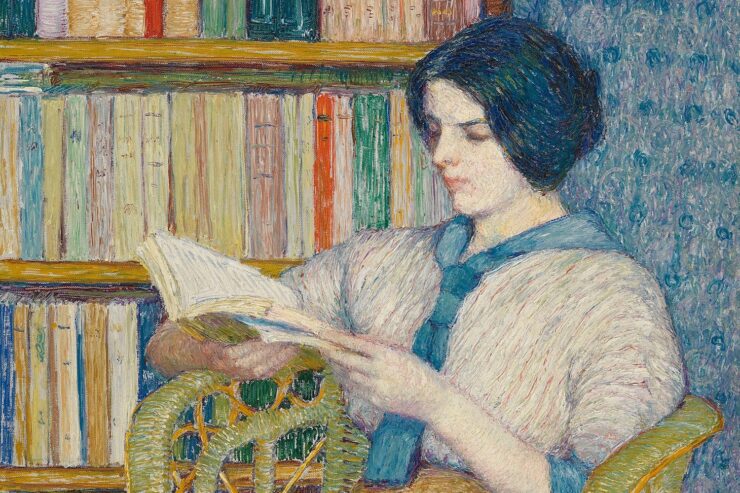
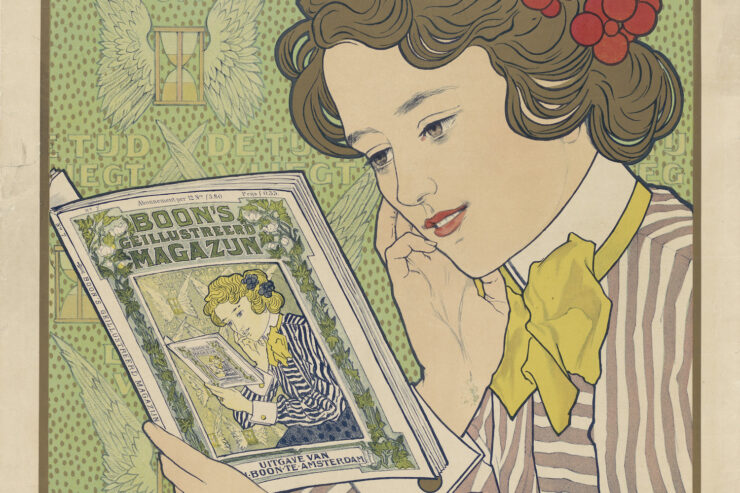
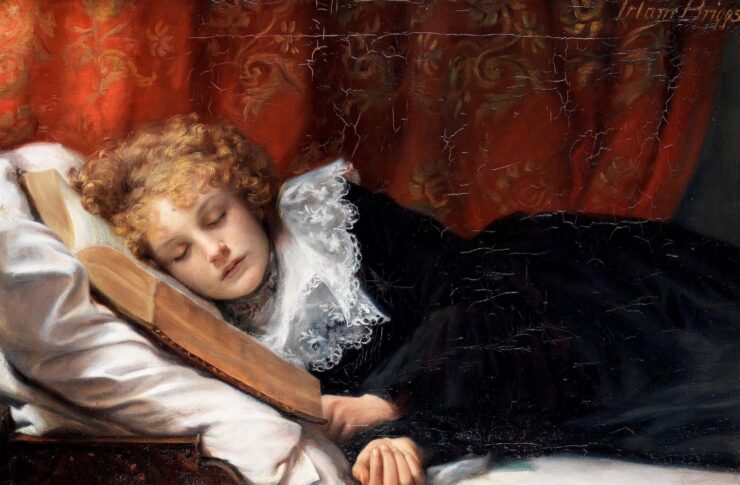
I love this, Molly. It resonated. I’ll have to plan a book rearranging day (or weekend, really) for the spring.
I love love love rearranging my book shelves. It feels like planning seating arrangements at a dinner of all the best people when I’m trying out a new organization theme/system.
I love the idea of my books hanging out with each other while on the shelf…my brain may have been heavily influenced by old cartoons. Those really old ones, where the characters in the books came out and had (to use a fresher reference) Toy Story-esque adventures.
As a kid, I had already feared my books were having adventures without me while I wasn’t reading them, cartoons like that stoked some inner land of make-believe that I never fully let go of.
For some reason, your essay on moving books made me remember my many happy book thoughts/imaginings, this is a very good thing. Thank you!
Now, go touch your books. :-)
Years ago, I made the horrifying discovery that I was allergic to book dust. I bought a barrister’s bookcase and a few under-the-bed plastic storage containers with tight lids. Only the most precious of the hardcover and trade books went into the bookcase, and favored and collectible paperbacks went into the containers. The vast remainder was donated to the library, a drive to refill a library damaged by a hurricane, or were recycled. Lots of memories and tears involved. These days, my books are digital which will make it much easier for everyone when I age out of my home or die.
I really recommend the storage boxes for paperbacks. These books are made so cheaply that the paper breaks apart with surprising speed. Taking away the oxygen and light slows this down.
Great article. I dearly wish I had enough shelves to fit all my books. Too many are in boxes and storage tubs. My wife used to complain about the quantity of the books, but now that I review old science fiction books for Tor, and an addition to the house gave us more basement space, those complaints have diminished. If I were a dragon, my hoard would be books.
Love this essay, especially the bit about arguing with oneself over whether to abandon an old still-unread book. I recently got through two books of personal/cultural essays I bought around 2007 (think ‘This American Life’ folks), and while I enjoyed both, waiting 15 years had the bizarre consequence of making me wonder why I’d gone out of my way to read so much commentary about the George W. Bush era.
I would have only 19 years’ worth of unread books if it weren’t for the two remaining from 2002. I’d read the first volume of a YA trilogy in 2001 and wanted to finish it, so purchased the others from a favourite used bookstore. Somehow didn’t get to either. The price-tags reflect the older of two inventory systems from this store, which hasn’t existed since the middle of 2005. I still want to read both books, and they’re now probably well out of print so I can’t just get rid of them and use the library. But it’s also been so very long since I read the first volume (only the once) that I need to reread it first, and I’m busy being distracted by all the other unread books, which as per this article I enjoy sorting and re-sorting.
My desire to re-sort the unread books comes from a general interest in sorting and arranging and quantifying things. (I am, unsurprisingly, a data-science person. The unread books are monitored by an Excel file with about 8 different graphs, and I probably should have realised that the Excel file in question would become basically a favourite computer game.) The major task is always to put the books I want to read the most immediately in the most convenient location – and which ones I want to read changes constantly because it depends on all sorts of variables, including a need to mix it up (I usually want to read something different from whatever the last 5-6 books I read were). So if I hit the point where the conveniently located books don’t look enticing, that means it’s time to open the boxes and pick a different selection! It’s like getting gifts without acquiring…you know, stuff.
oooh this made me so happy. I love organizing and sorting and purging, and I love books. I have a huge pile of ‘to be sorted’ books on my floor right now (I might also need to do some purging before they will all fit – probably my various pregnancy/infant books are no longer relevant) and I’m looking forward to the day I can dig into that.
I also have my own system for how I arrange my books (maintained in a word document I also maintain as my inventory). I hate clutter and stuff and amassing things, but books are the one exception (although no duplicates, NEVER duplicates…).
I have the same existential dread about my tbr list, which includes things recommended to me in HIGH SCHOOL (that is, the 90s) that I never got around to yet, or things that reflect some of those interests/friends groups that I can probably remove (although it sadly feels like giving up or accepting I’ve moved on from that identity). And all this new stuff keeps coming out! I will die with things on my TBR list and I hate that feeling.
I love physical books – I had made a comment elsewhere about avoiding audiobooks and somebody asked me why and it’s a topic that once I start going on about, I get weirdly passionate and defensive about it. Some of it is related to the way my mind processes info and how I pay attention. I absolutely cannot just sit still and listen to a book and actually absorb it, and if I’m multi tasking, that means I won’t actually be paying attention to the words. My mind wanders, I zone out, and sometimes I forget things I hear right after I hear them. (I’m bemused when I hear people talk about how they can’t concentrate on reading and the only way they can consume things is through audio as my brain is the exact opposite.)
Plus, when I read, I frequently like to circle back, or check a map, or find a passage. Sometimes I like to read fast/skim if it’s a part I’m not as engaged by, and sometimes I really need to stop and savor the prose, the emotional beat, the anticipation. Sometimes I need to sit and go down several rabbit holes of thought the book made me think about, or process something it brought up emotionally, memory wise, intellectually, etc. I feel like audio books rob you of that by forcing the pace of the reading, and making it much more difficult to go back to passages.
But a huge part of that is also the weight/feeling of the book in my hands – reading can be a really immersive/tactile experience for me. This is is also why I don’t prefer e-books (outside of a few specific types – I love them for short stories, for example). I have books I can pick up and feel the cover and remember where I was when I read them, when I bought them, how I felt, where I was sitting when I read that passage, whatever else was going on in my life, etc. I also tend to remember where passages were that I want to circle back on based on sight – whereabouts in the book it was.
Let me suggest another benefit. I like to put notes, cards, photos, from all over in random books. Nothing like pulling down a book and finding in it a thank you note, a note from a child, a love letter, obituary…whatever that brings back memories.
Lucky you, to still have space to expand; my last full handling, finally done a few months ago, was for a downsizing. OTOH, I did manage to look at every book and ask myself what the chance was that I was ever going to want even to skim a favorite section again. (I’m a sucker for happy climaxes; I still reread the council/parliament/trial/whatever-you-call-it scene from A Civil Campaign at least once a year, sometimes along with other key sections.) Or whether I wanted to read it at all, as the ~2/3 overall culling included close to half the books on my unread shelf — some free from conventions, a lot bought at end-of-{convention/season/year} sales. I have long been a sucker for sales and freebies, but vaguely realized a couple of decades ago how deadly this could be and started penciling dates of acquisition on the first leaf, so I could at least sense how many times I’d passed over a book — and at the rate new books are coming out I’m likely not to finish most of what’s left. But I did at least touch every single book as they all had to leave in some direction; I certainly made mistakes (how could I have let How Buildings Fall Down go?) but at least I took the time to think.
I bought a book in a charity shop in Shepperton recently and there was a very old 10/- note stuck in between the pages, probably used as a book mark once, a welcome find.
I savor the tactility of books. The sizes, the shapes, fit just *so* in my hands. Some books contain decades of happy memories. I love being in the comfy chair and disappearing inside a book [or series] for hours or days at the time. When I read paperbacks, I hold them in the death grip of doom. As in, I read Elizabeth Moon’s entire _Sheepfarmer’s Daughter_ trilogy in the massive tradepaper omnibus and put nary a crease in it.
Alas, that’s no longer possible. The arthritis came back. The last hardback book I read, my hands were sore for several days. Ah, you think, simply rest the hardback on the arm of the chair. Unfortunately, my eyes also went wonky. Reading that close with bifocals makes my eyes cross, and it’s too blurry without them.
I still disappear into books or series for whole days at the time, but these days it’s from the desk-top’s lovely large screen with the Kindle app. I look at the books double-rowed on bookcase after bookcase, and my eyes are still happy to see them. My heart and hands remember them still. Most are available in e-books. Those that are not, I just have to [try to] remember to take them in small bites, instead of inhaling them whole. I’m grateful for the decades I’ve had, and for the decades to come.
A couple weeks ago, I had a search through my book collection looking for The Peripheral by William Gibson. My grown son & I started watching the new tv series & I wanted to reread the book at the same time. I love Gibson & was certain I had all but his last book. I have 8 bookcases, as well as a couple boxes that had been in storage but haven’t found their way to a permanent spot.
Nope…didn’t find it. I did find a brown paper wrapped book with the indie store stamp on it! I opened it & found a fantasy with a beautiful book cover on it. First edition…no memory of buying it.
Fast forward to my next visit to the bookstore…looking for a copy of The Peripheral. Nope…didn’t find one. Picked up an author that sounded familiar; it was the sequel to the book I just found on my home shelf! Even better…it was a used copy so it was very affordable. The bookstore owner thought it was Destiny that I found it & looked it up as a possible new purchase. I’m in the middle of 3 other books but that found fantasy got moved up in the TBR pile!
I have a storage space full of my dad’s SF collection. That means I will have to clean out the shop and slowly bring my dad’s books home, box by box.
Anybody want a drill press? (the Klamath Tool Library will probably get that one, though).
@4AlanBrown “If I were a dragon, my hoard would be books.” Me, too. My dad gave me a T-shirt with a dragon sitting on a pile of books that says, “It’s not hoarding if it’s books.”
I love reorganizing my books when I have something new to add, either haul from a book sale or Christmas or a new shelving unit. Mostly, though, it’s for the sheer joy of organizing rather than refamiliarizing myself with my collection. As a young adult who’s only been collecting with serious intent for a few years, my library is still in the low hundreds. I have space in my apartment for one more tall bookshelf, but after that, I’ll have to get creative.
As for my TBR list, I almost never buy stuff unless I’ve read it before (and may feel like rereading it), so it’s strictly digital aside from period between checking them out from the library and marking them off the list. While this is a spatial and financial advantage, it does mean that I frequently forget why a book is on the list, and without the cover and summary and visual size of a physical copy, it can be difficult to decide what I really feel like reading next. On the other hand, picking strictly based on the extremely subjective impressions of a title can lead to interesting results.